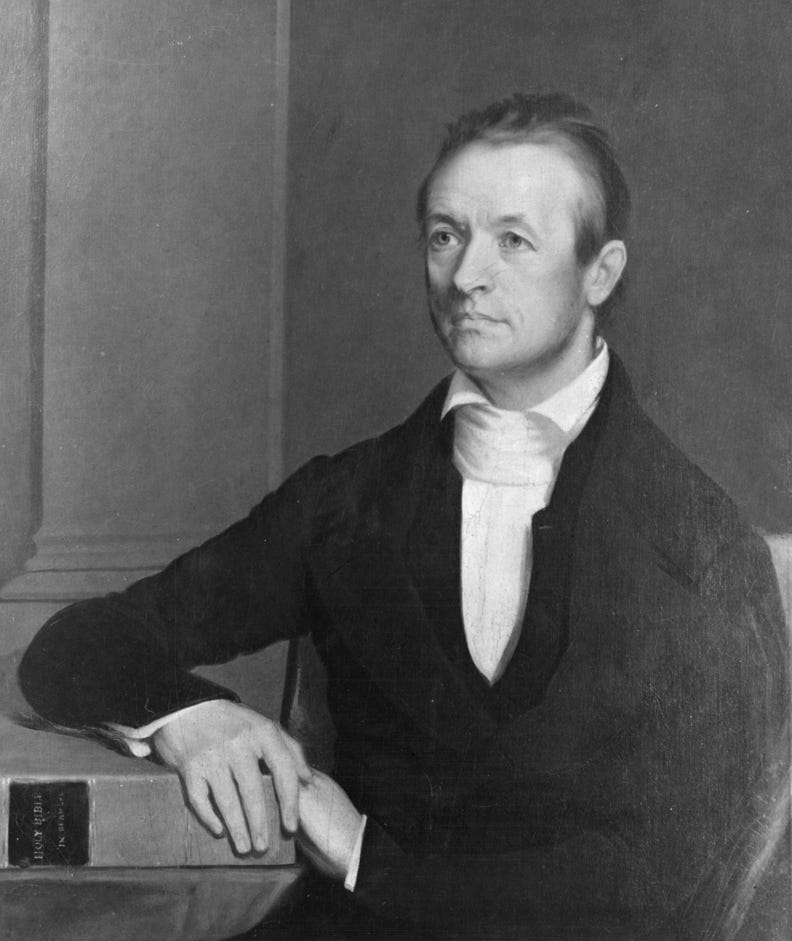
Discover more from Think Christianly, Live Faithfully
Everywhere you look, especially in Baptist life, you see the name Judson. This is because Adoniram Judson (1788–1850) and his first wife were the first commissioned foreign missionaries in American history. Adoniram spent almost forty years in Burma, which is now the nation of Myanmar. During his ministry, he helped lead hundreds of Burmese and Karen individuals to saving faith in Jesus Christ, translated the Bible and other Christian writings into two different languages, wrote numerous booklets and tracts on a variety of theological topics, and encouraged Baptists in America to unite together for the sake of foreign missions.
Conversion and Commission
Adoniram Judson was raised in a devout home; his father was a Congregationalist pastor. But upon attending Brown University, Adoniram fell in with a group of skeptical students and left college a convinced unbeliever. However, the tragic death of a close friend who was also a skeptic left Adoniram thoroughly shaken. Though he was not yet a believer, he was too afraid to remain a skeptic! He received special permission to attend Andover Theological Seminary, even though he wasn’t yet a Christian. Within a couple of months Adonriam became a follower of Jesus Christ.
While at Andover, Adoniram felt called to foreign missions, along with several of his classmates. This was shortly after the famous Haystack Prayer Meeting at Williams College in 1806, when other young New England Congregationalists also felt drawn to cross-cultural missions. In response to these missionary stirrings, the Congregationalists formed the American Board of Commissioners for Foreign Missions in 1810. Adoniram and four others were appointed to serve as missionaries to the Far East.
The key month in Judson’s life was February 1812. In the span of two weeks, he married Ann Hasseltine (called Nancy), was ordained to the gospel ministry, was commissioned as a foreign missionary, and set sail for Calcutta, India. The Judson’s and their boat-mates, Samuel and Harriett Newel, became the first Americans to choose to relocate from one nation to another solely for the purpose of spreading the gospel among unreached peoples.
Baptism and Burma
As Congregationalists, the Judson’s believed in infant baptism. They knew that upon arriving in India they would meet William Carey, the famed Baptist missionary. During the voyage, Adoniram studied baptism in the Bible, hoping to counter Carey’s arguments. Instead, he came around to Baptist convictions! Within a few weeks, Nancy also became a convinced Baptist.
Upon their arrival in Calcutta, the Judsons received believer’s baptism by immersion from one of Carey’s colleagues and resigned their appointment with the American Board of Commissioners. The Judsons resigned because they didn’t feel like they could plant churches that baptized infants, which is what they had been sent out to do. While their resignation spoke to their integrity, it also meant that they were now without financial sponsorship.
Luther Rice, another Congregationalist missionary who followed the Judson’s to Calcutta, also became a Baptist. The three of them agreed that Rice would return to America to encourage American Baptists to financially support the mission. Rice proved instrumental in the formation of the first Baptist foreign missionary society in American history, while the Judson’s were the first missionaries the society supported.
The Judson’s relocated to Burma. They began learning the Burmese language and culture, believing both were necessary for effective gospel proclamation. Bible translation became a key plank in the Judson mission, with work being done in both Burmese and Pali (the latter was an older language preferred by cultural elites). By the end of his life, Adoniram had translated the Bible into Burmese, edited several dictionaries and lexical tools for Burmese Christians, and authored or translated numerous tracts on a variety of theological and devotional topics. Historians agree Adoniram’s pioneering translation work remains his most lasting legacy.
Trials and Tribulations
The Judson’s were frequently acquainted with sickness, suffering, and death. They lost three children. After falling gravely ill, Nancy spent two years in America convalescing, only to discover she and her husband were celebrities! Shortly after Nancy returned to the field, war broke out between Burma and England.
In 1824, the Burmese emperor imprisoned virtually all Western men as presumed spies for the British government. This included Adoniram, who spent nineteen months in two different prisons, including one overseen by convicted murderers who had been spared death in exchange for serving as jailers! Many prisoners died, but Nancy’s devotion kept Adoniram alive. She pestered, begged, and bribed so that she could provide food for her imprisoned husband. She even managed to give Adoniram his personal pillow, into which was sewn his translation of the Burmese Bible. All the while, Nancy was nursing an infant and raising two orphaned Burmese girls.
Adoniram was eventually released from prison so that he could serve as a translator for the peace negotiations between Burma and England. But the end of the war wasn’t the end of the Judson’s sufferings. Nancy died in 1826, followed by two-year-old Maria Judson six months later. Adoniram’s grief led him to eventually retreat into seclusion. He grew increasingly reclusive, finally building a hut in the jungle. He named his hut the Hermitage and spent forty days living in the jungle, eating little besides minimal rice rations. He dug his own grave and spent many hours contemplated death.
The jungle was tiger-infested, and many locals feared Adoniram would be eaten. When he returned safely from his self-exile, everyone was surprised he had survived. Over the course of 1830, Adoniram increasingly emerged from his spiritual darkness with new resolve to reach Burma for Christ. He enjoyed a decade of evangelistic fruitfulness, especially among the tribal Karen people. He also continued his translation work and mentored the steady stream of younger Baptist missionaries coming to Burma to work among both the Burmese and Karen. Adoniram married two more times and made one trip to America, where he spoke about missions all over the Eastern Seaboard. He died in 1850.
Legacy
Adoniram Judson and his three wives, especially Nancy, hold a preeminent place in the history of missions. His baptism and subsequent resignation highlights the importance of doctrinal and personal integrity. His endurance through numerous trials reminds us of the way God often uses suffering to advance the gospel. His grief over the loss of a wife and daughter serves as an important reminder that missionaries are real people with real needs, struggles, and aspirations. His commitment to evangelism continues to inspire. Finally, Adoniram’s translation work, his most important legacy, continues to reap gospel fruit in Myanmar and serve as an example for countless missionaries the world over.
Judson College at Southeastern
I decided to devote this week’s newsletter to Judson because of the announcement earlier this week that Southeastern Baptist Theological Seminary has renamed their undergraduate college Judson College at Southeastern. The name seems fitting for a school whose unofficial motto is “Every Classroom a Great Commission Classroom.”
I taught adjunctively for Southeastern during the 2006-2007 academic year before serving as a full-time faculty member at the school from 2007 to 2015. For the first three of those years, I taught exclusively in the undergraduate program. In my later years at Southeastern, though I transitioned to mostly teaching graduate courses in the MDiv and PhD programs, I continued to teach at least one or two college courses annually. I’ve thought about those college courses a lot this week. Those were great years, and I’m still close to many of my former students.
Interested in Studying Baptist History?
Since we’re talking about Baptist history, and Southeastern Seminary, this seems like a good week to mention that I continue to teach at the school on a part-time basis. Since 2015, I have served as an adjunct professor of historical theology. In that role, I supervise PhD students in historical theology. Most years, I have also taught a doctoral seminar during the fall semester. I’m grateful that the administration at North Greenville University has allowed me to continue this strategic relationship with Southeastern.
This fall, I’ve been teaching a PhD seminar on the history of Baptist theology, which I teach during even years. During odd years, I typically teach seminars related to the history of evangelicalism in the English-speaking world. My PhD students have written dissertations on figures such as Andrew Fuller, William Carey, Jonathan Edwards, Charles Spurgeon, and Richard Fuller. If you are interested in studying Baptist history (and other topics) with me and my colleagues in the PhD program at Southeastern, send me a message.
Note: Much of this week’s newsletter has been lightly revised from a short essay originally written for the International Mission Board in 2018.
Subscribe to Think Christianly, Live Faithfully
Equipping believers to think rightly about God and his Word for the sake of living rightly before God in his world.











